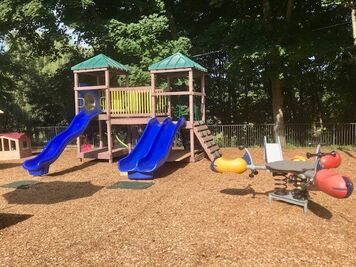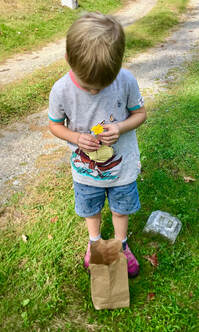Educational Philosophy
|
The mission of St. Philip’s Nursery School, in partnership with St. Philip’s Episcopal Church, is to provide a vibrant and nurturing preschool experience for the two, three and four -year old children of our community, encouraging them to be active, confident, curious, and well-prepared for further education and lifelong learning.
At St. Philip’s, children gain responsibility and respect for themselves and others, build friendships, and interact cooperatively. Play is at the heart of learning at St. Philip’s. Believing that children learn by doing, teachers encourage students to explore their surroundings, and work with a wide variety of materials to create, build, and experiment. We affirm the uniqueness of each child as we value and support their development intellectually, socially, physically, spiritually, and emotionally. We welcome children of all faiths, ethnicities, socioeconomic backgrounds, and family structures. |
Our Mission Statement language above reflects our belief that each child is unique, and so we call ourselves child-centered. We also believe passionately in the importance of play, which we believe is the work of children. It is through play that children make the important discoveries about themselves and their environment.
Our Mission Statement also refers to helping children grow in four developmental domains: intellectual (or cognitive), social, emotional, and physical. Another name for this philosophy is Developmentally Appropriate Practice. As defined by the National Association for the Education of Young Children (NAEYC), developmentally appropriate practice refers to teaching decisions that vary with and adapt to the age, experience, interests, and abilities of individual children with a given age range. It means:
Our Mission Statement also refers to helping children grow in four developmental domains: intellectual (or cognitive), social, emotional, and physical. Another name for this philosophy is Developmentally Appropriate Practice. As defined by the National Association for the Education of Young Children (NAEYC), developmentally appropriate practice refers to teaching decisions that vary with and adapt to the age, experience, interests, and abilities of individual children with a given age range. It means:
- Meeting children where they are, as individuals and as a group, and
- Helping each child reach challenging and achievable goals that contribute to his or her ongoing development and learning.

Here are some examples (Comments and queries are those of the teachers, shortened for space reasons.)
Cognitive Skills
Critical and creative thinking: "What do you think you could build with these pine cones and sticks?"
Organizing, analyzing, generating, integrating, and evaluating skills: "How have you changed since you were a new baby? How are you different? How are you the same?"
Scientific understanding: "What happened to the ice cubes that we put in the sun?" "What do our new plants need to grow?"
Mathematical understanding: "How many colors of jelly beans are there in the bag? How many beans of each color?"
Language; Effective communication through listening, speaking, writing, and reading: "What would you like to say in a letter to your grandmother?" "What was your favorite part of the story?" "Tell our class about your new baby brother." "What sound does this letter make? What other words starts with that sound?"
Self-expression through the visual and performing arts: "What story is your painting telling us?" "Which instrument would you like to play today? What is it about the sound of the triangle that you like?"
Social Skills
Internal behavior controls: "I like how you waited to say our prayer before you ate your snack."
Successful patterns of interaction: "When you asked Susie if you could play with her, you two had fun."
Cooperative attitudes and actions: "You and Sam did a great job of cleaning up these blocks together."
Helpful attitudes and actions: "Thank you for bringing me a tissue."
Responsible attitudes and actions: "You remembered that the plants need watering!"
Appreciation and respect for individual and cultural similarities and differences: "How does Miguel say 'Hello!'"
Respect for the environment: "I like how you picked up that paper from the ground and put it in the trash."
Emotional Skills
Self-awareness: "How does that story make you feel?"
Decision-making: "What activities would you like to choose this morning?"
Independence: "Please pick out a book for the class to hear."
Appreciation of own cultural identity and heritage: "Share with us the special meal you celebrated."
Self-confidence: "I like how you decided to try going down the bigger slide all by yourself."
Positive self-esteem: "You said you could do it and you did!"
Physical Skills
Competence in use of large and small muscles: "That's the way to hold your scissors; now let's cut some fringe." "What muscles do you use when you jump over the pool noodles?"
Physical fitness: "Let's run three times up and down this path"
Care and respect for the body: "Why is it important to have a checkup with the doctor?"
Appreciation and enjoyment of human movement: "Let's dance from this end of the room to that end!"
This is just a brief summary of the skills in each domain. During a morning at St. Philip's, children have the opportunity and are assisted to make progress in each one.
For more information, read more at the NAEYC Website.
We also have resource books describing Developmentally Appropriate Practice that parents are welcome to borrow; just ask the Director.
Cognitive Skills
Critical and creative thinking: "What do you think you could build with these pine cones and sticks?"
Organizing, analyzing, generating, integrating, and evaluating skills: "How have you changed since you were a new baby? How are you different? How are you the same?"
Scientific understanding: "What happened to the ice cubes that we put in the sun?" "What do our new plants need to grow?"
Mathematical understanding: "How many colors of jelly beans are there in the bag? How many beans of each color?"
Language; Effective communication through listening, speaking, writing, and reading: "What would you like to say in a letter to your grandmother?" "What was your favorite part of the story?" "Tell our class about your new baby brother." "What sound does this letter make? What other words starts with that sound?"
Self-expression through the visual and performing arts: "What story is your painting telling us?" "Which instrument would you like to play today? What is it about the sound of the triangle that you like?"
Social Skills
Internal behavior controls: "I like how you waited to say our prayer before you ate your snack."
Successful patterns of interaction: "When you asked Susie if you could play with her, you two had fun."
Cooperative attitudes and actions: "You and Sam did a great job of cleaning up these blocks together."
Helpful attitudes and actions: "Thank you for bringing me a tissue."
Responsible attitudes and actions: "You remembered that the plants need watering!"
Appreciation and respect for individual and cultural similarities and differences: "How does Miguel say 'Hello!'"
Respect for the environment: "I like how you picked up that paper from the ground and put it in the trash."
Emotional Skills
Self-awareness: "How does that story make you feel?"
Decision-making: "What activities would you like to choose this morning?"
Independence: "Please pick out a book for the class to hear."
Appreciation of own cultural identity and heritage: "Share with us the special meal you celebrated."
Self-confidence: "I like how you decided to try going down the bigger slide all by yourself."
Positive self-esteem: "You said you could do it and you did!"
Physical Skills
Competence in use of large and small muscles: "That's the way to hold your scissors; now let's cut some fringe." "What muscles do you use when you jump over the pool noodles?"
Physical fitness: "Let's run three times up and down this path"
Care and respect for the body: "Why is it important to have a checkup with the doctor?"
Appreciation and enjoyment of human movement: "Let's dance from this end of the room to that end!"
This is just a brief summary of the skills in each domain. During a morning at St. Philip's, children have the opportunity and are assisted to make progress in each one.
For more information, read more at the NAEYC Website.
We also have resource books describing Developmentally Appropriate Practice that parents are welcome to borrow; just ask the Director.
